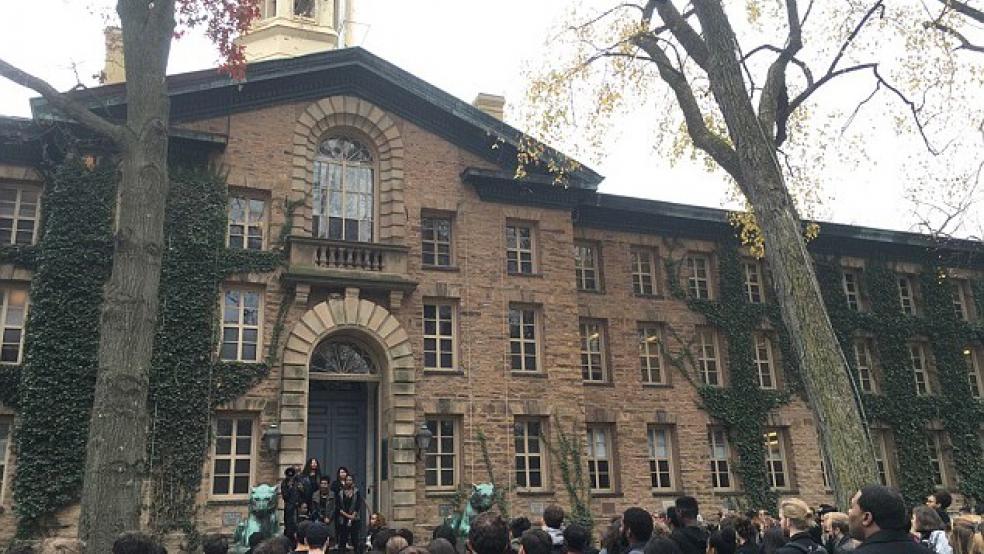While students from Yale University in Connecticut to Claremont McKenna in California are protesting, demanding more cultural sensitivity, safe spaces and trigger warnings, some students at Princeton University in New Jersey are fighting back.
In response to a sit-in of the university president’s office by 200 members of the Black Justice League, over 1,300 members of the university community signed a petition to ensure that Princeton “maintains its commitment to free speech and open dialogue and condemns political correctness to the extent that it infringes upon those fundamental academic values.”
Related: The Closing of the Millennial Mind on Campus
As signatures on the petition climbed, students formed the Princeton Open Campus Coalition. They wrote to Princeton University President Christopher Eisgruber and asked to meet with him to discuss preserving the freedom of speech and civil debate that are the hallmarks of a classical education. Evan Draim, a Princeton senior and one of the group’s founders, told me in an email: “We hope that our peers at other colleges gain inspiration from what we are doing at Princeton.”
The Black Justice League’s demands include a dorm for those who want to celebrate black affinity; mandatory diversity training; and a requirement that students take a course on so-called marginalized peoples. They also want the renaming of the Woodrow Wilson School of Public and International Affairs and the removal of a mural of President Woodrow Wilson. Wilson, who graduated from Princeton in 1879 and who served as the university’s president from 1902 until 1910, formally segregated the federal workforce.
Eisgruber has agreed to set aside four rooms on campus for the use of students of different cultures, and to consult with faculty and the board of trustees on other demands.
Asanni York, a junior who helped organize the protests, said the university was not doing enough to address racial problems on campus, and that “black students on this campus feel uncomfortable every day.” York told me: “I’m focused less on how President Eisgruber resolved the sit-in and more on how campus will change in the next two semesters.”
Wilson was a racist by today’s standards, but he was hardly a reactionary figure in his time. As university president, he tried unsuccessfully to disband Princeton’s now-famous eating clubs on the grounds that they were elitist, and he pioneered the idea that Princeton should be a university “in the nation’s service.” As America’s president, Wilson substantially expanded the size and scope of the federal government including such institutions as the Federal Reserve Board.
Related: Yale, Mizzou and Others--Training a Generation of Proto-Fascists
Campus protests are the latest in many students’ efforts to be protected from situations that they find difficult. Some students are concerned about eliminating “micro-aggressions” — speech that might, intentionally or not, be offensive. They are asking for “trigger warnings” so they can avoid material that might upset them. All of that results in limiting speech because, if something is potentially offensive, then, according to the new campus fads, it should not be said. And practically everything is potentially offensive to someone.
The fear of limiting speech is what led to the Princeton petition countering the Black Justice League’s demands. The petition’s signatories are concerned that eliminating any mention of Wilson constitutes “historical revisionism”; that mandating what courses students have to take would allow the BJL undue power over the curriculum; and that having black-affinity housing would result in de facto campus segregation.
They suggest that a “diversity requirement” should permit students to study any minority culture, not just a marginalized one, and that students should also have to take a course in Western civilization.
One of the Princeton Open Campus Coalition’s members, Beni Snow, a freshman from Massachusetts, told me: “I don’t think of myself as fighting against the Black Justice League. I agree wholeheartedly that racism is an issue that needs to be addressed. I simply feel that the way to fight racism should not include methods that limit anyone’s academic freedom.”
Related: University of Michigan Fires a Shot at Free Speech
Not only is the Black Justice League trying to squelch academic freedom, but it falsely added the signature of politics professor Robert George to the letter sent to President Eisgruber. George is the founder of the James Madison Society, which provides intellectual diversity by bringing conservative speakers to campus.
George wrote in a Facebook post: “In what is the most underhanded tactic I have encountered in 31 years in academic life, my name was fraudulently added to a petition supporting student protestors at Princeton. ... Needless to say, this is extremely distressing — especially because the issue concerns values I cherish and that I believe are being placed in peril on campuses around the country, including my own.”
It used to be that education was about being challenged. Now some students want to be shielded from different views and debates. That will not prepare them for life after college. Let’s hope that the example of the Princeton Open Campus Coalition will be emulated by students in universities around the country.
This piece was originally published in Market Watch. You can read more by Diana Furchtgott-Roth at economics-21, economic policies for the 21st Century.






